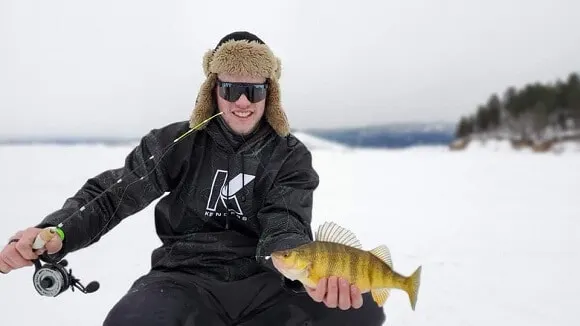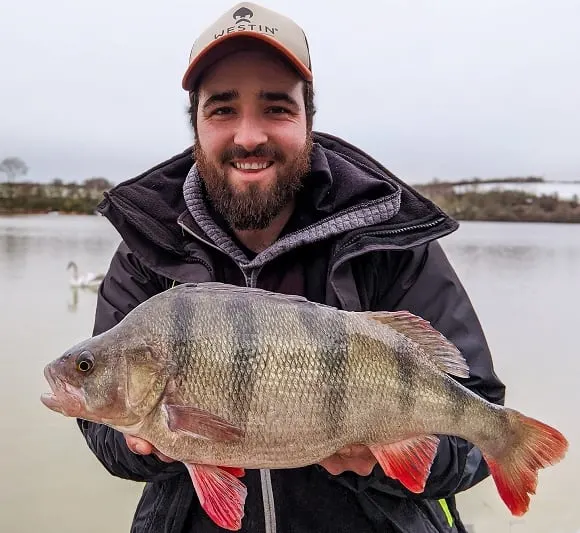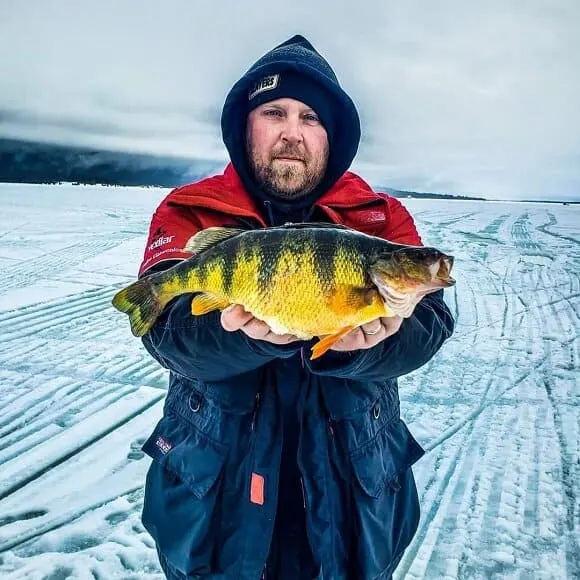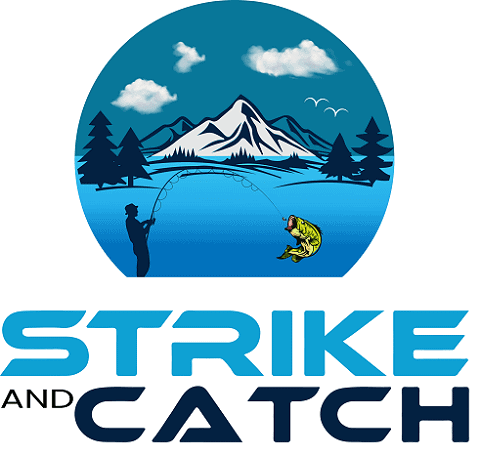Perch react rather strongly to different weather patterns and if you are fishing in the wrong conditions, catching them can be quite difficult. In order to help you catch more perch and optimize your precious fishing time, I wrote this article on the best weather for perch fishing.
Perch fishing can be absolutely brilliant on overcast days, with mild temperatures, and a slowly falling barometric pressure. Additionally, if there are southern winds and a light drizzle present, chances are good that you will catch a lot of perch.
Continue reading this article if you want to know more about the perfect weather for targeting perch.
Pro Tip: Having an accurate weather forecast station at home can be of great help when planning your perch fishing trip, especially when it comes to barometric pressure. You can find a great forecast station on Amazon here.
Best Weather Conditions for Perch Fishing
I don’t know how many hours and sessions I have fished for perch, in all weathers, during all times of day. As it’s one of my favorite species, the number is definitely in the hundreds, if not thousands.
During all those sessions, I have experienced both brilliant perch times and absolutely devastating ones.
Both of these occurrences can be linked to different weather conditions, and while the weather is not the only factor that matters when it comes to perch, it sure is a very important one.
Fish, and perch, in particular, react strongly and often rather abruptly to weather changes, and considering and better understanding factors such as temperatures, winds, and barometric pressure can make all the difference on the bank!
I have found the following weather conditions to be the most favorable ones for perch, no matter the season:
Temperature
Perch become rather inactive in both too hot and too cold temperatures. Moderate ones, on the other hand, meaning somewhat milder in spring, fall, and winter and somewhat cooler in summer, seem to suit them very well.
Try to focus on periods with more or less stable moderate temperatures and avoid sudden and drastic temperature shifts.
Barometric Pressure
The barometric air pressure is perhaps the most important weather factor when it comes to perch fishing.
If possible, target days with either a stable low-pressure system or a slowly falling barometric pressure. I cannot stress this enough; perch love this kind of air pressure!
Especially periods of time that move from high pressure to low can be absolutely deadly for perch. It’s like someone turning a switch and putting the fish into hyperactivity mode.
Winds
As always, when it comes to fishing, southern or southwestern winds are the ones you are looking for. They often come in combination with milder air temperatures, less stable weather conditions, and lower barometric pressure.
In other words, if less comfortable weather and such winds are approaching or are already present, it’s go time for perch!
Clouds
Overcast skies are definitely preferable when it comes to perch fishing, as they prefer feeding in somewhat poorer light conditions.
Once again, cloudy days often also bring more moderate temperatures and lower barometric air pressure, which is a winning combination if you want to target perch.
Often, overcast days also mean longer feeding periods, as they basically act as a link between mornings and evenings and exclude the light factor altogether.
Another bonus of clouds is that they often lead to rain.
Rain and Snow

Drizzles, or light rainfall, as well as light snowfall, can equal really good perch fishing. Sure, it’s not all that comfortable to be out on the bank in such weather, but the rewards you’ll reap are certainly worth it!
Rain both provides more cover for hunting perch and oxygenates the water, which means that it has the power to boost the fish’s activity.
So, whenever there is a rain front heading your way, make sure to be on the bank to catch those bad weather perch!
Pro Tip: If you’re out fishing in colder weather and it starts to rain, make sure to bring the appropriate clothing with you in order to keep warm and dry. If the perch are at it, you do not want to miss that opportunity because you’re getting soaking wet! Check out my favorite rain suit for fishing on Amazon here.
Now that we’ve gone through the best weather conditions for perch, let’s take a look at the absolute worst weather for this species
Worst Weather Conditions for Perch Fishing
Days with clear skies and a lot of direct sunlight shining onto the water surface, a rising or high barometric pressure, and very hot or cold temperatures can be considered the worst weather conditions for perch.
Additionally, if you’re experiencing cold northern or eastern winds while fishing, you will most likely have a very hard time catching perch. It’s like someone put a lock over the entire venue and many times, despite often occurring in rather large schools, you won’t be able to hook any perch at all.
It is on these days that many anglers will try out various lure types, sizes, colors, techniques, and rigs in order to lure at least the occasional perch.
But to be brutally honest, all that changing up won’t make much of a difference, as they will hit virtually anything on days with favorable weather conditions.
So, if you want to optimize your fishing time, consider skipping days and weather patterns like these and focus on the days with the right weather. It’ll save you from blanking and will make your sessions so much more enjoyable!
RELATED READING: European Perch vs. Yellow Perch (How Are They Different?)
Best Time of Day to Catch Perch

Now that we’ve covered the weather aspects, let’s take a look at the best times to fish for perch. If you couple the above-mentioned favorable weather conditions with the best time of day to target perch, you’ll increase your chances of success even further!
Spring
During spring, when the water is still cold and the air temperature is only increasing slowly, perch fishing is at its best during the hours between late morning and early afternoon.
During this time, the sun will warm up both air and water a little more than during the rest of the day, which equals more active and hunting perch.
Pro Tip: Try out night fishing for perch during warm spring evenings and nights! You could end up having the session of a lifetime!
Summer
Early mornings and late evenings are the absolute best times of day for summer perch fishing.
As day temperatures are usually way too warm during the summer months, daytime fishing should be avoided. Instead, focus your attention and time on those hours around dusk and dawn, as the perch will be most active and hungry then.
RELATED READING: Check out my in-depth article on night fishing for perch!
Autumn/Fall
With decreasing air and water temperatures, perch will once again be at their most active during the day. More specifically, the hours between morning and early afternoon are often the very best for fall perch fishing.
Do not arrive at the water too early, as it is highly unlikely that they will start feeding before first light this time of year.
Similarly, fall perch will often seize all hunting and feeding in the later hours of the afternoon, which, most commonly, means that you can call it a day.
Winter

When fishing for perch in winter, the best time of day is the period between morning and noon.
The water temperature is now at its absolute lowest, and the perch have slowed down their metabolism and feeding activity considerably.
This does by no means imply that they will not hunt and feed though, but merely that, now more than ever, time is of the essence!
Very often, the perch will now only feed during short periods throughout the morning, in order to save energy and make it through the winter.
So, regardless if you are targeting them in open water or through the ice, make sure to fish focused and effectively during that time of day, as it is very likely that it will be your only chance to catch them.
However, if you do manage to find the perch and time for those short winter feeding sessions, you can expect a lot of bites!
RELATED READING: White Perch vs. Yellow Perch (How to Tell Them Apart)
Final Thoughts
As always when it comes to weather patterns, nothing is set in stone and there will be regional differences, which is something to keep in mind when reading this article.
The above-described weather factors are generally really good for perch fishing. They have worked on many waters and are confirmed by a lot of anglers from all over the world.
However, exceptions can sometimes be the rule in your water, and so you, of course, cannot be 100% certain that these best weather scenarios will work for you.
Nonetheless, they are a great starting point if you’re new to perch fishing or simply lack knowledge about how weather patterns are affecting your venue and the perch that live in it.
They will work most of the time, and hence, they can help you optimize your time and improve your fishing.
Tight lines!
Related Perch Fishing Articles
- Top 10 Perch Fishing Tips and Tricks
- Best Live Bait Rigs for Perch
- Ledgering for Perch (Best Rigs and Baits)
Featured image courtesy of Gary Spillard

